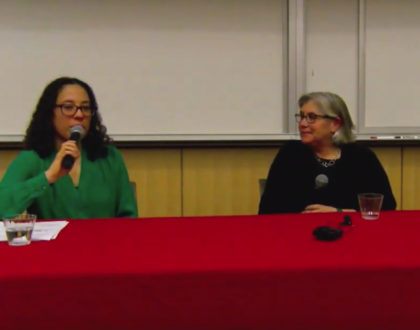Crunching the Numbers on Equity – Using Data to Advance Racial and Gender Diversity in Organizations

As more and more organizations take measures to improve diversity, equity, and inclusion in the workplace, there’s an increasing number of conversations surrounding the role of data in this work. How do you track progress in your diversity and inclusion efforts? How do you measure individual and organizational change? Our Director of Research and Evaluation, Ivette Tapia, recently joined a panel as part of a collaboration between YW Boston and Northeastern University’s Dukakis Center for the Myra Kraft Open Classroom course titled Crunching the Numbers on Equity – Using Data to Advance Racial and Gender Diversity in Organizations.
The panel discussion included insights from the innovative work performed by many industry experts, including our Dialogues team’s groundbreaking work around evidence-based change management and evaluation. Last year, YW Boston’s Dialogues on Race and Ethnicity program refined a unique assessment tool in conjunction with the Northeastern University Public Evaluation Lab aimed at measuring the success of diversity and inclusion efforts within an organization.
Ivette Tapia was joined by:
- Alisa Lincoln, Director at the Northeastern University Institute for Health Equity and Social Justice Research
- Laurie Dopkins, Executive Director at Northeastern University’s Public Evaluation Lab
- Su Joun, Principal and Owner at Diversity@Workplace Consulting Group, LeadBoston participant
- Michael Gaskins, Diversity Recruitment Officer & Exam Administrator at the Boston Police Department
- Greg Sobczynski, Office of Diversity and Civil Rights at Massachusetts DOT
- Bernard Guinyard, Director of Diversity & Inclusion at Goodwin Procter, LLP
Here are our top three takeaways from Crunching the Numbers on Equity – Using Data to Advance Racial and Gender Diversity in Organizations:
1. The key to any successful diversity and inclusion program lies in knowing what to measure
An increasing number of studies are reporting the competitive benefits of inclusive cultures in the workplace. As a result, more and more companies yearn for evidence-based diversity and inclusion programs that incorporate robust feedback and evaluation processes. Yet, it’s important to be mindful of what is being measured. We know diversity without inclusion is not enough, therefore DE&I efforts should aim to look beyond demographic information and quotas. Doing so can provide comprehensive insights on what’s “moving the needle” when it comes to individual and organizational change. Among other things, YW Boston’s Dialogues program administers assessments of multicultural awareness, employee engagement, and other indicators at recurring intervals.
2. Set your own baselines and let them guide your action plan
YW Boston’s Director of Research and Evaluation Ivette Tapia emphasized the importance of gathering primary data. Organizations should set their own baselines, rather than use tertiary data or industry benchmarks. Every organization is different and possesses unique strengths and areas for growth. “During YW Boston’s Dialogues program, assessments are made before any interventions occur in order to identify challenges and how interactions should look like. Based on this information, we bring together anecdotal data from conversations with the organization to inform our recommendations and action plan.”
3. Trust is a key component in every step of the way
We’ve covered the importance of data in diversity, equity, and inclusion work–it provides us with ways to measure progress and can help us build roadmaps to a goal. Yet it’s important to remember that quantitative data does not provide us with a full picture. “It’s important to build trust between those who are collecting data and those who are implementing it.” In order to gather valuable qualitative data, trust must be built between evaluators and participants. For that reason, YW Boston’s Dialogues program specializes in fostering environments where participants can feel comfortable openly sharing their experiences around race and ethnicity.
Watch the full session of Crunching the Numbers on Equity – Using Data to Advance Racial and Gender Diversity in Organizations below.
About Dialogues on Race and Ethnicity
As the first YWCA in the nation, YW Boston has been at the forefront of advancing social equity for over 150 years. Our Dialogues program has provided over 100 organizations with a structured way to openly talk about race in order to identify and address barriers to equity and inclusion. Using our advanced assessment tool and the latest research on behavioral and organizational change, Dialogues partners with organizations to create an action plan and provide them with the resources needed to drive organizational change.
Ready to unlock the power of diversity in the workplace? Learn more about YW Boston’s Dialogues on Race and Ethnicity program.
